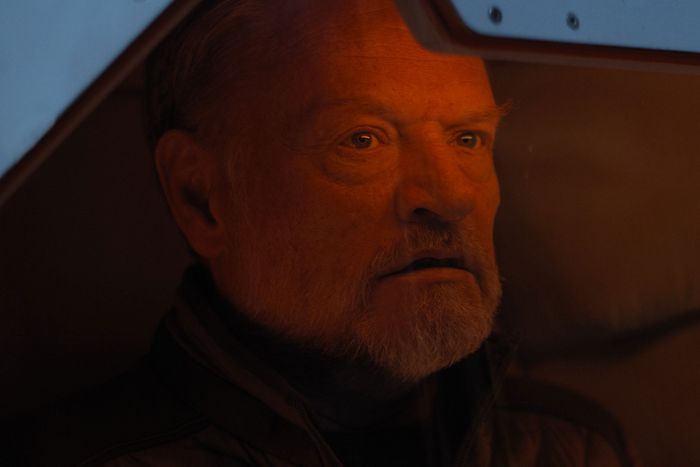
Spoilers forward for “Creation Myths,” the season-two finale of Basis.
Season two of Basis has been a transparent enchancment from season one. There’s extra regular connective tissue between its many timelines and far-flung tales, and it’s gotten higher at constructing smaller emotional arcs that assist floor every episode. The present wanted to maneuver farther from Asimov’s authentic texts and grow to be much more TV-like, which makes full sense as the very best method for an adaptation of an infamously unfilmable story. Characters have to stay round longer and have extra intense and long-lasting relationships with each other. Gaal Dornick, after being frozen in time, will get to have an entire relationship together with her daughter, Salvor Hardin, and so they each understand it’s bizarre and poignant. Hari Seldon, the person who kicked off the whole Basis disaster, can stay within the story to look at the way it all performs out and put his thumb on the size of future. Even in season one, the central idea of Basis’s TV adaptation was to create a tool that will enable Lee Tempo to stay on the present ceaselessly, and that’s simply good writing.
However season two has additionally come proper as much as the far fringe of how lengthy characters can hold round in a narrative with out breaking the stakes. It’s one factor to create extra long-arc figures whose emotions and motivations will help glue collectively a giant story concerning the centuries-long collapse of civilization. It’s one other factor when the story insists that none of these central characters ever be allowed to die, thereby stopping the largest, most critical conflicts from ever feeling fairly large or critical sufficient.
Gaal Dornick was jettisoned into house in a cryofreeze containment system, rescued, allowed to play out an entire fascinating reunion story together with her daughter, and is now coming into cryofreeze but once more so she will affect a later stage of the second Basis. An unlimited cataclysm destroys the planet Terminus, killing everybody together with Bel Riose’s husband — besides not! As a result of they’re all rescued by the Vault, which additionally rescues Brother Fixed, who’d been despatched hurtling out into house. Most egregiously, there’s Hari Seldon, who had already died and been revived at the start of season two, just for it to occur once more later within the season by the use of psychic possession that allowed him to in some way punch his method out of a water jail.
A number of characters do seem to have really died by the top of season two, together with Hober Mallow, Bel Riose, and most importantly, Salvor Hardin. They’re distressing deaths, particularly Salvor’s, and her sacrifice to save lots of Gaal turns into an necessary motivation for what is going to are available in season three. Besides as soon as it turns into doable for the ghost of Hari Seldon to stroll into a large rock formed like a head and are available out with a brand new physique, or for that physique to then die by drowning after which in some way nonetheless be alive via … punching (?) … it’s exhausting to belief that Salvor’s actually gone. Everybody from Terminus survived within the Vault, in any case! Perhaps in some way the Vault saved a psychic document of Salvor, too, and she will discover her personal rock formation that appears like a head and get again to doing humanity-saving stuff. A chunk of the Mentalic witch girl was saved contained in the mind of a little bit boy. Perhaps Salvor’s in another person’s mind! You by no means know!
Clearly, both of these resurrection situations could be explicitly foolish, which Basis solely hardly ever deigns to be. That doesn’t change the truth that that is now a present with a reasonably wholesome document of resurrection situations. It’s exhausting to actually settle for the necessity to mourn for Salvor Hardin, regardless that Gaal appears certain she’s gone.
Within the broader sense, diminishing the efficiency of loss of life in Basis additionally diminishes a number of the present’s central thematic weight. Its main preoccupation is with the interlocking however distant connections between particular person actions and large, universe-size shifts, and one of many key tragedies at its core is that though some people may be completely essential, in lots of different circumstances they merely don’t matter all that a lot. Typically the present is adept at enjoying with that concept. Season two’s climactic scene the place Emperor Day is shoved out the airlock performs into exactly that rigidity of immortality and continuation versus particular person personhood: Everyone knows one other Emperor Day will present up instantly, trying and sounding and ruling nearly precisely the best way the earlier one did. Day’s complete arc this season, although, is supposed to place stress on the distinction between this specific man and the opposite males in his genetic cohort. His existence is each a canny character system and engaging thought experiment: How a lot of personhood is distinct from genetic make-up? How a lot deviation can there be between these an identical copies? However the counterexample is Hari Seldon, whose a number of deaths and resurrections (and now cryofrozen future) solely get muddier. How a lot does he change between resurrections? What precisely are his motivations now? Is he an individual, or a god, or a handy story system with a penchant for mansplaining?
This may occasionally find yourself being a season-two drawback, and season three could have a greater deal with on the right way to stability persevering with characters with significant stakes. Basis’s enchancment from season one to season two is loads of motive to hope that the present will proceed to development in the appropriate path. The repair is comparatively easy, in any case: Let the lifeless keep lifeless, and in the event that they should come again, discover extra wise methods to do it than having them psychic their method out of a drowning.

